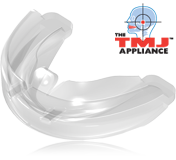Treatment of the TMJ disorders
 TMJ Stands for the temporomandibular joint which is the joint that connects the lower jaw (mandible) to the temporal bone of the skull which is found immediately in front of the ear on each side of your head. The joints are flexible allowing the jaw to move smoothly up and down and side to side and enabling you to talk, chew, and yawn. Muscles attached to and surrounding the jaw joint control the position and movement of the jaw.
TMJ Stands for the temporomandibular joint which is the joint that connects the lower jaw (mandible) to the temporal bone of the skull which is found immediately in front of the ear on each side of your head. The joints are flexible allowing the jaw to move smoothly up and down and side to side and enabling you to talk, chew, and yawn. Muscles attached to and surrounding the jaw joint control the position and movement of the jaw.
What causes TMJ disorders?
There are some possible causes for the TMJ disorders such as:
Grinding or clenching the teeth which puts a lot of pressure on the TMJ.
Dislocation of the soft cushion or disc found inside the joint.
Inflammation of the joint due to other systemic diseases as rheumatoid.
Stress which can cause a person to tighten facial and jaw muscles or clench the teeth.
People with TMJ disorders can experience severe pain and discomfort that can be temporary or can last for years. Women experience TMJ disorders more than men and it is most seen commonly in people between the ages 20 and 40.
Common symptoms include:
Pain or tenderness in the face, jaw joint area, neck and shoulders and in or around the ear when you chew, speak or open your mouth wide.
Limited ability to open the mouth very wide.
Jaws that get "stuck" or "lock" in the open or closed mouth positions.
Clicking or popping sounds in the jaw joint when opening or closing the mouth or during chewing, which may or may not be accompanied by pain.
A tired feeling of the face.
Difficult chewing or a sudden uncomfortable bite as if the upper and lower teeth are not fitting together properly.
Swelling on one or both sides of the face.
Other symptoms as toothaches, headaches, neck aches, dizziness, ear aches, hearing problems, upper shoulder pain.
Tretment of the TMJ disorders:
-
Resting the joint:
You can rest the joint by eating soft food and not using chewing gum. Also avoid opening the mouth very wide (so try not to yawn too widely). Massaging the muscles and applying warmth can help.
Other treatments are relaxation and stress-reducing therapies because people tend to clench their jaw when they are stressed or because stress makes pain worse. -
Using TMJ appliance:
The TMJ appliance is a prefabricated, soft, flexible (medical silicone) appliance that is provided by Dr. Ashraf Harris.
It works best to relax the muscles for extra relief for the TMJ . It treats symptoms by decompressing the joint through its aerofoil shaped base and eliminating the effects of bruxing with its double mouth guard effect.
Further relief is provided by the change in the resting length of the muscles when the appliance is in place.
This treatment assists in relieving the symptoms, limiting bruxism and grinding and improves patient comfort.
The appliance should be used most of times during the day (at least one hour a day) and should be used all overnight while sleeping. With good compliance, symptoms should reduce in the first few days but for complete pain relief sometimes several weeks of use are necessary. Continue to use the appliance for a minimum of 30 to 60 days after which you can determine how much continued use is needed to maintain symptom relief.







